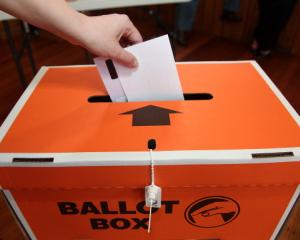
After an almost weekly diet of being reminded the Labour-led coalition is a tax-and-spend government, Mr Bridges has committed his party to some tax cuts.
His party has already said it will index tax thresholds to the cost of living and will scrap the regional fuel tax. Now, it has a tax plan to benefit the average wage.
Of course, it is far too early for Mr Bridges or any other of our politicians to reveal too much of what they hope will help them in the ultimate job interview on September 19.
Detail is so scant as to be non-existent, save the promise it will help the ‘‘average Kiwis’’ Mr Bridges so frequently mentions in his speeches.
Small businesses have been promised some form of tax relief, some form of regulation reduction and as-yet undefined infrastructural growth to help put money back in pockets.
To build upon this, the party will, sometime soon, announce a plan to make ‘‘people on the average wage better off and keeping more of what they earn’’, he says.
Enticingly, Mr Bridges on Monday said ‘‘people on the average wage shouldn't be paying almost 33% in the dollar’’. Indeed, this is right — none of them should: the average wage does not meet the 33% tax threshold. It comes close, but not close enough.
The highest tax rate kicks in when a wage earner earns more than $70,000. For income between $14,000 and $48,000, that same earner pays 30%.
Statistics New Zealand says the average weekly wage in New Zealand in the year to the December quarter was $1272.12. That’s just over $66,000 a year.
So Mr Bridges is right: average wage earners should not be paying the highest tax rate so long as the average wage stays as low as it is. Voters will hope for further stimuli to ensure it does not.
It follows that voters — at least, voters who are prepared to vote according to policy rather than habit or political tribe — will want a plan for growth.
Tax cuts will be fine if returning more money to taxpayers enhances savings and investments, and keeps the stimulatory money-go-round going.
There will be plenty of unease about paltry cuts which do little for voters who are struggling to afford their households, their mortgages or their rents, let alone starting investment portfolios.
There is no chance National will propose anything as paltry as the so-called ‘‘chewing gum cuts’’, which the Labour-led government abandoned in 2005. But after three years of being told all manner of the country’s infrastructure and social programmes needed investment, voters will not want to see cuts for the sake of cuts.
National will need to ensure its package is not funded by cutting services or investment, and that it is sustainable and does not disbenefit the people fuelling the economy.
Trimming tax revenue and cutting budgets simply returns the burden to taxpayers who must either find — and fund — new ways to access services, or go without.
The party has already signalled it will go after the Government's tertiary fees-free policy and KiwiBuild, and would further ‘‘target’’ the work being done by the Regional Growth Fund. National wants the opportunity to deliver on its rhetoric. We must also understand the opportunity cost.
Comments
The editorial makes a false claim that "For income between $14,000 and $48,000, that same earner pays 30%."
It is in fact, 17.5%.
Surely on an editorial on tax, the ODT could at least get basic income tax rates right.
This is deja vu all over again, and none of it adds up.
Bridges says that no one should be paying 33% tax, that implies that it's the top tax rate that he is going to cut. But he also says that it's middle income earners that will benefit. But middle income earners don't pay the top tax rate.
The trouble with tax cuts is that it's not just for a year or a term but it's locked in as no party is going to raise taxes, it's political suicide. Cuts are all well and good when the economy is ticking over nicely, but the next GFC or earthquake is on the way.
If Labour are a tax and spend party then National are a borrow and spend party. Key's government increased the debt at last three fold in nine years and had only one surplus. The Clarke government paid back debt, created the Cullen fund and had eight years of surpluses.
It's the governments job to tax and spend. Bridges is promising tax cuts, additional spending and less debt. He can't have all three.












